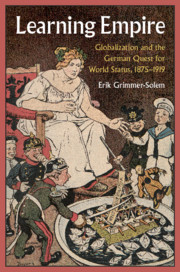Book contents
- Learning Empire
- Learning Empire
- Copyright page
- Contents
- Illustrations
- Acknowledgments
- Abbreviations
- Introduction
- Part I Absent-Minded Empire, 1875–1897
- Part II Empire Imagined, 1897–1907
- Part III Empire Lost, 1908–1919
- 9 Colonial Dreams
- 10 World Policy Contained
- 11 From World Policy to World War
- 12 War Aims, Peace Resolutions, and Defeat
- Epilogue
- Selected Bibliography
- Index
11 - From World Policy to World War
from Part III - Empire Lost, 1908–1919
Published online by Cambridge University Press: 20 September 2019
- Learning Empire
- Learning Empire
- Copyright page
- Contents
- Illustrations
- Acknowledgments
- Abbreviations
- Introduction
- Part I Absent-Minded Empire, 1875–1897
- Part II Empire Imagined, 1897–1907
- Part III Empire Lost, 1908–1919
- 9 Colonial Dreams
- 10 World Policy Contained
- 11 From World Policy to World War
- 12 War Aims, Peace Resolutions, and Defeat
- Epilogue
- Selected Bibliography
- Index
Summary
This chapter analyzes the forces pulling Germany into war in 1914 and how both the international republic of letters and the integrated world economy were shattered by it and the crippling blockade imposed by Britain. It also explores the work done by Hermann Schumacher, Max Sering, and Gustav Schmoller to rationalize wartime raw materials and the food supply, as well as their activity advocating for unrestricted submarine warfare. Despite strong prewar ties between Germany and the United States and active efforts to court American public opinion by Bernhard Dernburg in New York, the “war of words” was won easily by the Entente. The decision for unrestricted submarine warfare is set in the context of the failure of dreadnought deterrence and the tightening blockade, which had rendered much of the High Seas Fleet impotent and led to the loss of Germany's overseas colonies and bases.A growing rift emerged by 1916 between populist forces unleashed by Alfred Tirpitz and the “submarine professors,” on the one hand, and the Kaiser and government of Bethmann Hollweg, on the other, which now also included Karl Helfferich as Treasury Secretary.
Keywords
- Type
- Chapter
- Information
- Learning EmpireGlobalization and the German Quest for World Status, 1875–1919, pp. 494 - 540Publisher: Cambridge University PressPrint publication year: 2019

